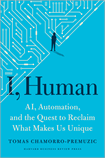- Innovation
AI—The Human Dimension
Tomas Chamorro-Premuzic reveals how AI is changing the way we live and the way we are

Tomas Chamorro-Premuzic, a psychologist, data scientist, and professor at University College London and Columbia University, has examined the extensive research data related to human interactions with digital technology, to date, to find answers to this critical question. The result of his deliberations is recorded in his new book: I, Human: AI Automation, and the Quest to Reclaim What Makes Us Unique.
AI enabled tools, using big sets of data and the power of prediction, are increasingly making our decisions for us. Retailers chart our every desire, recruiters select us or not, dating apps choose our potential partners, and social media—for many the prime source of information—distracts us with fake news and conspiracy theories. A chat box that according to its founder “produces problematic answers and exhibit biased behaviour” just adds to the dehumanized mix.
On the other hand, it is undeniable that AI can be a major force for good in helping humanity address the multiple challenges it faces in an increasingly complex world. From less biased hiring to more accurate medical diagnosis, AI is already driving scientific and social progress in many areas. While AI is still in its infancy, naysayers will blame it for any number of social ills and AI-evangelist will admit no faults.
Using AI data analytics himself, Chamorro-Premuzic focuses on the reality of where we are now and how we got here, with an aim to find “what new and perhaps better ways could we express our humanity in this current chapter of our evolutionary history?”
His greatest concern is not, as the Luddites fear, that robots will take all the jobs or that hyper-intelligent machines will rule over us sometime in the future. Rather he sees an immediate and current danger in the way we have “managed to somehow automate ourselves and our lives”—how the AI age has brought a culture of standardization and sanitized monotony, diluting human creativity, variety, richness and imagination.
The technological efficiency brought by AI to many aspects of our lives can, from a psychological perspective, bring a number of negative consequences. Amongst these Chamorro-Premuzic cites:
AI as a distraction tool. Information overload, digital connectedness, easy access to entertainment have led to a “poverty of attention.” This has been intensified by data-driven metrics pushing more at us. Distracted and overloaded our brains struggle to focus.
The end of patience. The inherent speed of the AI age is making people more impulsive. Patience and deliberation are relegated in favour of fast response and instant gratification.
Feeding vs. reducing biases. Algorithms trace our biases and feed us with further ammunition to exacerbate our prejudices and ignorance. On the other hand, dispassionate data-driven machines can also help us reduce biases in our decision-making.
Digital narcissism. By legitimizing public displays of egotistical and self-obsessed behaviour, the AI age has encouraged a culture of narcissism and entitlement—traits that lead to emotional detachment and a false view of reality.
Dull predictability. AI as a ‘prediction machine’ is also turning humans into predictable machines, prone to repetitive automaton-like behaviours—staring at screens, sending emojis, asking Siri to play another track. This simplifying of experience denies the complexity of life.
Demise of curiosity. With knowledge so instantly available, we need to rediscover the habit of asking why, and sometimes thinking it out for ourselves. Instant knowledge does equate with wisdom.
The book’s final chapter, How to Be Human, is headed with a quote from Maya Angelou: “You may not control all the events that happen to you, but you can decide not to be reduced by them.” This encapsulates the purpose of this unique book: to explain how AI is changing our lives, values, and ways of being—right now, never mind what this implies for the future—and to propose the means by which AI should and can enhance and enrich human experience rather than reduce it.
………………………………………………………………………………………………………..
ARTICLES YOU MIGHT LIKE
VIEWPOINT
Cognitive neuroscientist, Lynda Shaw, explains how to understand and support intrapreneurs
DEVELOPING LEADERS QUARTERLY MAGAZINE AND WEEKLY BRIEFING EMAILS

































